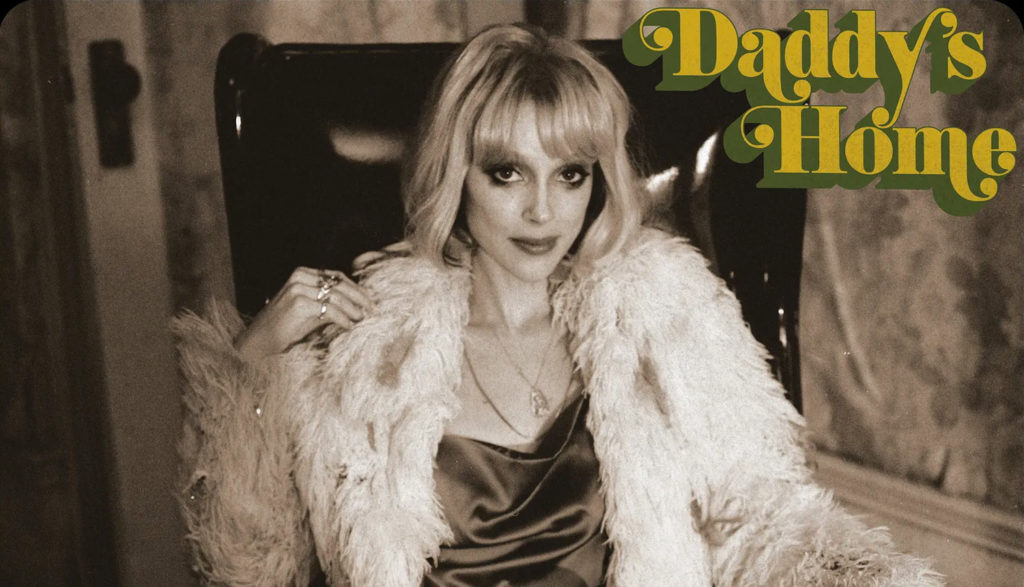
Annie Clark has been making music for almost two decades, but you’ve likely never heard her name. That’s partially because she goes by the stage name St. Vincent, and partially because she spent a significant portion of that time as a stage guitarist rather than a solo artist.
Still, since 2007, this influential alternative artist has released six studio albums, the most recent being her 2021 effort Daddy’s Home. It deals with multiple themes and ideas, including the collapse of cultural institutions, how to stay true to yourself, and the singer’s place in the entertainment industry following her recent mainstream breakthrough. (Her previous album, Masseduction, was nominated for two Grammys, winning one for Best Rock Song). Both lyrically and musically complex, Daddy’s Home cements St. Vincent as one of today’s cornerstone alternative artists—but not without using some questionable content to get her ideas across.
Daddy’s Home features multiple tributes to important people in Clark’s life. In three different interludes (each entitled “Humming”), she recognizes her mother and the trials she’s suffered. “My mom hummed all the time,” Clark told Genius, “She’s probably hummed several symphonies.” On “The Laughing Man,” Clark pays tribute to a childhood friend who passed away (“I know you’ve gone, you left the scene/Heaven had more important things”), and she also recognizes the entertainment icons who inspired her on “The Melting of the Sun”.
The title track references a scandal in Clark’s family: In 2010, her father was arrested and charged with multiple counts of conspiracy and wire fraud. She sings about visiting him in prison and says she’s still close to him: “And we’re tight as a Bible with the pages stuck like glue/Yeah, you did some time, well, I did some time too.”
On “Somebody Like Me,” Clark sings about making a marriage commitment (“Dress up in white/Slip on the ring/Walk straight down the aisle/To the violin strings”). (That said, it should be noted that Clark has identified as gender fluid in the past and has had high-profile relationships with other well-known female entertainers.) “Down and Out Downtown” is a touching tribute to her hometown of New York City, which heavily influenced her both personally and musically.
A major theme throughout the album is maintaining your identity despite fame and success. On “Live in the Dream,” Clark hopes that she won’t follow in the footsteps of some who came before her and who became consumed by their public persona, resolving to absorb her success rather than let it define her sense of self (“But stay with me, you fallen lamb/And I’ll keep you in my arms/But I can’t live in the dream/The dream lives in me.”)
One of the significant issues of Daddy’s Home is the contrast between good ideas with questionable execution. “Down” is about escaping an abuser, but Clark sings about doing so via a revenge fantasy (“Mama always told me/‘You got to turn the other cheek’/But even she would agree, you’re an exception to that rule”).
“My Baby Wants a Baby” wrestles with the responsibilities of motherhood, but Clark decides that she enjoys her life too much to make room in it for a child (“My baby wants a baby … /But I wanna play guitar all day/Make all my meals in microwaves/Only dress up if I get paid”). She expresses a strong pessimism about life and its hardships on “Pay Your Way in Pain.” Clark often begins with an interesting idea that she could have taken in a strong direction, then veers from it in unbiblical ways.
References to drugs and alcohol are also issues here. On “The Melting of the Sun,” she tells the tragic stories of several entertainment icons. Clark sings about Marilyn Monroe shooting heroin, then imagines her saying “H—, it’s better than abuse,” referring to the poor treatment the star received throughout her life and career.
Clark also sings about musician Tori Amos’ experience with sexual assault and references Nina Simone’s song “Mississippi G-dd-mn”, as well as her own history with benzodiazepines, a medication for anxiety and insomnia. On “The Laughing Man”, Clark admits that she struggled with alcohol after her friend’s death (“Like the heroines of Cassavetes/I’m under the influence daily”), as well as grappling with her own suicidal thoughts. In “… At the Holiday Party”, she reconnects with an old friend; they get “wine-lipped a little early,” and the singer notices her friend has “pills and JUULs and speed” in her purse.
“Candy Darling” is an homage to a transgender actor who died of lymphoma at the age of 29.
Language isn’t frequent or strong enough for any of the songs to earn explicit ratings. But Clark uses “h—” and God’s name is paired with “d–n.” We hear a couple of s-words, too.
St. Vincent is nothing if not interesting. Over six albums and decades of experience in music, Annie Clark has established a corner for herself in the alternative music world. That has given her the freedom to explore complex and personal ideas.
But let’s be clear: That doesn’t mean her work is necessarily family friendly. If the language and references to drugs and alcohol aren’t enough to warn parents away, some of the questionable conclusions Clark reaches in her lyrics should be. No, you don’t “got to pray your way in shame,” as she claims in “Pay Your Way in Pain.” And, no, a child is not a burden that prevents you from having a legacy, an issue she worries about in “My Baby Wants a Baby”.
There are definitely ideas and stylistic flourishes to appreciate here. Clark is an undeniably talented musician (she’s credited on the album not only as one of two writers, but as playing the synthesizer, sitar, and guitar); her tributes to her parents and childhood friend, as well as the city in which she was raised, are powerful.
But it sometimes seems that for every insightful lyric she pens, it’s followed by one that’s questionable.


Lauren Cook is serving as a 2021 summer intern for the Parenting and Youth department at Focus on the Family. She is studying film and screenwriting at the University of North Carolina School of the Arts. You can get her talking for hours about anything from Star Wars to her family to how Inception was the best movie of the 2010s. But more than anything, she’s passionate about showing how every form of art in some way reflects the Gospel. Coffee is a close second.